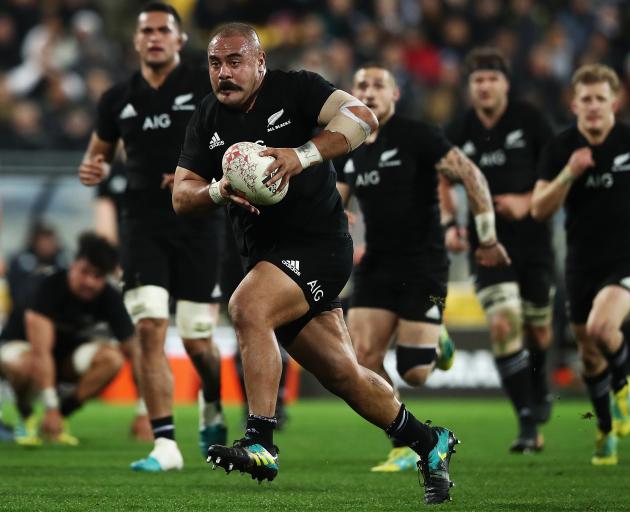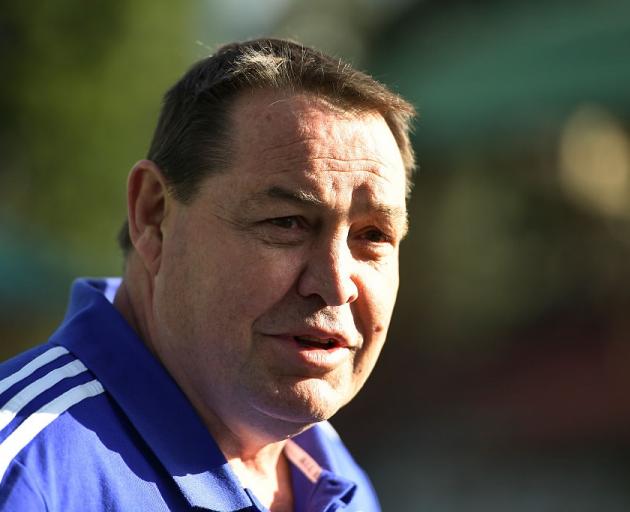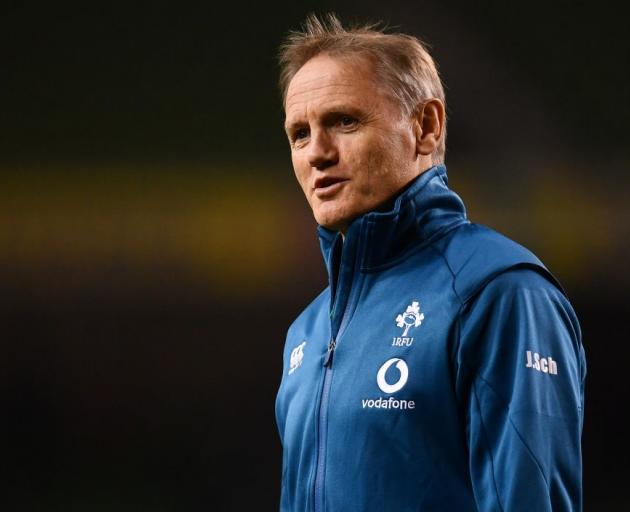
1. Who was the big winner for the All Blacks in 2018?
Patrick McKendry:
Ardie Savea. The No7 was outstanding as Sam Cane's injury replacement this year and proved he can be a genuine option as a test No8 with a stunning performance there against Argentina. Tough and a good defender, Savea was one of the best at getting the All Blacks across the advantage line despite the claustrophobic defensive atmosphere in London and Dublin. He was also a big reason why the All Blacks beat the Boks in Pretoria.

Karl Tu'inukuafe. Such a rare story in the professional rugby ranks. The one-time bouncer shed almost 40kg to make his Super Rugby debut for the Chiefs and then earn a call up to the All Blacks on the back of his destructive scrummaging ability. His work around the park was just as impressive – and he also happens to proudly sport a proper slug. In a country where rugby futures are mapped out from puberty, Tu'inukuafe is one out of the box.
Wynne Gray:
You could plump for five eighths Brett Cameron who is an All Black after nine minutes against Japan but in the main group, Jack Goodhue moved past injury then glandular fever to show his skills and temperament are ready for a long run at centre. Since the last RWC, Malakai Fekitoa, Sonny Bill Williams, George Moala, Ryan Crotty and Anton Lienert-Brown have been tried but Goodhue with A L-B look the best bets.
2. Who was the biggest loser?
McKendry:
Waisake Naholo went from virtually writing his own name next to the No14 jersey to being completely out of the picture despite not doing a lot wrong. It appears the All Blacks coaches want more of a ball player with a better aerial game, hence Ben Smith and Jordie Barrett appeared there against England, Ireland and Italy. But as a power runner, there are few better in the game than the Highlanders wing.
Napier:
Waisake Naholo. A case could be made for Sonny Bill Williams or Liam Squire but the All Blacks are more likely to retain faith in those two. Naholo's finishing prowess was influential for the Highlanders and he had moments with the All Blacks early in the season. But his form and work-rate then tailed off and he fell out of favour during the northern tour. When conditions aren't hard, fast and dry it seems there are concerns about Naholo's kicking game and perhaps under the high ball. In an immensely competitive area, he is now under pressure to retain his place.
Gray:
In the search for another loose-forward, Akira Ioane wasted his chances. He had been inside the squad several times but fell so far out of favour he could not make a planeload of 52 for the end of year tour. Someone who made the most of his chances was Jordan Taufua but the Crusaders loosie missed the June series because of a leg strain then an end of year tour because of a broken arm.
3. What will the All Blacks' 2018 campaign be remembered for?
McKendry:
As the year in which the rest of the top nations finally caught up to the All Blacks. South Africa should have beaten them twice and England probably deserved to win at Twickenham. Ireland thoroughly deserved their win in Dublin. The margins have always been relatively close but now they are virtually non-existent. The big question is; can these improvements by the Boks and the Northern Hemisphere nations drive the All Blacks on to another level for the World Cup?
Napier:
Given public expectations, it will be defeat in Dublin, largely because Ireland finished the year as top dogs, regardless of rankings. Settling for second best is not something the All Blacks are accustomed to. This year should also be remembered for experimentation with many different combinations trialled in the back three, midfield, blindside and front-row. Once again depth has grown and while improvements must be made, lessons will be absorbed.
Gray:
Front and centre will be the struggles from the disjointed series with France, the difficulties against the Springboks and the tough times on the end of year tour. There was an awkward flow about their work with most questions about finding the right combinations and style of backline play as every position came under scrutiny.
4. What was the biggest surprise of the 2018 rugby season?
McKendry:
The Springboks' revival, and in particular they performance in overturning a big early deficit in Wellington to inflict a first home loss on the All Blacks (by them) since 2009. It also seemed inevitable that the All Blacks would cross their line in the final minutes, but somehow the Boks held them out. It was a remarkable effort.
Napier:
Fiji upsetting France in Paris. Maybe not the biggest surprise but certainly the most notable. France have long been prone to the odd mental meltdown but that should not detract from Fiji's first win in Paris. Beaten 54-17 by Scotland at Murrayfield the previous week, it just shows what Fiji are capable of with more time together and a hint at the threat they could be at the World Cup. This result also speaks to the benefits of the Drua team, filled by local players, which won Australia's provincial competition this season. Imagine how good Fiji could be with proper resource and a Super Rugby pathway. Hint, hint.
Gray:
Picking and sticking with Damian McKenzie at fullback for the big end of year tests with the Wallabies, England, Ireland and Italy because he fits the latest theory about twin attacking options in phase-play. That choice shows how quickly ideas alter about trends in the game, which players fit those concepts and how the game can become more complicated than it needs be.
5. What state of health is Super Rugby in?
McKendry:
Good as far as the Crusaders and possibly the rest of New Zealand (even including the Blues after their recent coaching changes) are concerned. But not great elsewhere with the exception of the Lions in South Africa and Jaguares in Argentina. The Australian franchises are a basket-case performance-wise but that's not surprising given the shambolic nature of the game there at the moment. Unfortunately, the difference in quality between the teams is too great, and apart from the NZ derbies, there is little to get excited about. So the competition isn't in great health.
Napier:
Ailing at best. Any form of expansion must now be off the table after the last exploration proved a total failure. Interest from a New Zealand perspective is almost exclusively confined to Kiwi derbies, and much-maligned format changes have constantly eroded credibility. With leading players set to be managed more than ever in World Cup year, this once compelling competition has serious challenges.
Gray:
It's lingering in the recovery ward. The NZ derbies are compelling but changing the format and ideas on a regular basis hinders its appeal while the expansion into Argentina and Japan has further estranged interest. Who knows what the parties will come up with for the 2020 season but it would be nice to think their vision matched that number.
6. Biggest overreaction of 2018?
McKendry:
The apparent decline of the All Blacks – from world beaters to also-rans. This is partly driven by pre-World Cup apprehension in New Zealand but the All Blacks will be the favourites in Japan still and rightly so. They haven't suddenly become a poor team.

Defeat to Ireland in Dublin. Calling for the heads of Kieran Read and Steve Hansen was quite ridiculous. Just when you thought we had passed the point of New Zealand losing all perspective, the knee-jerk panic swiftly returned. Sure the All Blacks have much to do but the reaction was also disrespectful, to a point, towards Ireland. Those who flew off the deep end failed to acknowledge what a heroic effort this was.
Gray:
Take your pick; the world-beater tag reapplied to Jordie Barrett after he scored four tries against Italy when any club player should have scored three of them or the frenzy about the millionth idea for a new waterfront stadium in Auckland.
7. How do NZR stop the best players leaving the country?
McKendry:
Keep doing what they're doing. There's no exodus of payers leaving despite some headlines suggesting that. The lure of the black jersey remains as strong as ever. Players will always want to experience life overseas – but many more will want to stay and fight for a chance to represent or keep representing the All Blacks.
Napier:
They can't. The export of New Zealand rugby talent will never cease. Competing on salaries is but a faint dream, particularly with the middle tier and fringe All Blacks who can, in some cases, triple earnings. New Zealand, like all southern neighbours, will therefore always lose quality. Same in regards to coaches. Five Super Rugby posts is not nearly enough to retain rugby's richest pool of mentors. With players, the best hope is to be flexible, allow for sabbaticals that see players return to the All Blacks and Super Rugby after short-term stints abroad. This also works for those only skipping the provincial season. Alternatively, more will leave for good. New Zealand, already well-established on this path, also needs to become the country which best looks after athletes by continually managing workloads and helping prolong careers.
Gray:
They don't but the best don't leave until the time is right and they've had another shot at a World Cup. Others not quite in the front line of selection like Malakai Fekitoa, Lima Sopoaga, Tawera Kerr-Barlow, Steven Luatua, or those sliding out of frame like Julian Savea and Jerome Kaino take their chances to cash in on significant offers of an overseas lifestyle. The NZ production line is strong enough to cover exits from class acts like Aaron Cruden and Charlie Faumuina
8. When should Steve Hansen go? And who should replace him?
McKendry:
Reading between the lines, it appears Hansen is ready to call it quits after next year, and that's probably the right time to go as he's achieved all he's wanted to. His replacement is a trickier question and it probably comes down to Ian Foster or Joe Schmidt. I'd be inclined to go with the latter because of what he's done with Ireland but it appears he doesn't want the job, or at least the job as it stands now. Foster, then.

After the World Cup seems logical, though Hansen is not shy to pull a surprise. By that point he will have attended five World Cups and spent 15 years in the All Blacks coaching team. Should he step aside, I'm of the view the best management team should get the nod. Sure the head coach is the most important piece but it is no good having a lightweight crew around them. Strong individual candidates are obvious; who they have with them remains to be seen.
Gray:
Hansen should go when he feels it's best for him and the team. That appears to be after the 2019 World Cup although that goes against his previous theory about coaches staying to assist the transition between tournaments. If he goes we have to see who is available. Joe Schmidt has opted out so until we hear more the contenders might be Ian Foster, Warren Gatland, Dave Rennie, Jamie Joseph, Tony Brown, Vern Cotter, Scott Robertson.
9. Your favourite rugby moment of 2018?
McKendry:
There have been a few: The Crusaders winning back-to-back titles under new coach Scott Robertson, Karl Tu'inukuafe's remarkable rise at the All Blacks, and the pure joy in Dublin as Ireland mad history with a first win over the All Blacks on home soil. Of all those, I'd have to go with Ireland's achievement.
Napier:
The atmosphere at Aviva Stadium was like nothing I've ever experienced – better than Ellis Park or Twickenham in full flight. Shoulder to shoulder sent shivers down the spine and the noise just kept coming. The feverish crowd sung, cheered, and rode every play. Every soul was uplifting.
A world away at the Levin Domain, David McErlean rumbling over to steal the Lochore Cup from Wairarapa Bush was special, giving Horowhenua-Kapiti their first trophy in 25 years, in their 125th anniversary season. A nod also to the Thames Valley Swamp Foxes – this year's true Cinderella story after knocking over Wanganui and South Canterbury away from home to clinch the Meads Cup.
And the men's and women's sevens teams claiming gold at the Gold Coast Commonwealth Games, especially the Black Ferns' triumph in extra time, stands out too.
Gray:
Watching the smile emerge from under the moustache of loosehead prop Karl Tu'inukaufe on debut as a substitute when he led the shunt at his first scrum to earn the All Blacks a penalty against France. His teammates doubled up on the delight for a player who was not in the frame for Super rugby three months earlier.
10. Your biggest rugby gripe of 2018?
McKendry:
The shocking inconsistency from match officials towards illegal tackling in the Northern Hemisphere last month and in particular the way Owen Farrell escaped sanction for his no-arms tackles against the Springboks and Wallabies at Twickenham. Each case was bad in isolation; put them together and the tacit encouragement that Farrell and others have received to keep tackling like that defies logic.
Napier:
Owen Farrell getting away with two shoulder charges. The first, which allowed England to sneak past the Springboks, warranted at least a penalty. The second, against the Wallabies last week, was even worse. Either there is some unwritten law that Farrell gets a free pass at Twickenham or he must have nude photos of someone important stashed away. All we ask for is consistency. These instances make a mockery of World Rugby's so-called edict to crack down on illegal tackles.
Gray:
The lack of space in the game compounded by the match officials' inability to monitor the offside lines.
